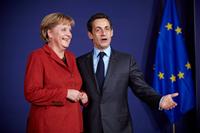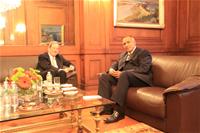EU is facing difficult decisions about the economic governance
Ralitsa Kovacheva, September 29, 2010
 The European Commission will bring forward concrete legislative proposals on the economic governance of the Union today (September 29). The process of its establishment is on the finish line and is expected to be finalised during the European Council in late October. On the eve of the public presentation of the Commission's proposals, these were discussed by the Task Force, led by EU President Herman Van Rompuy.
The European Commission will bring forward concrete legislative proposals on the economic governance of the Union today (September 29). The process of its establishment is on the finish line and is expected to be finalised during the European Council in late October. On the eve of the public presentation of the Commission's proposals, these were discussed by the Task Force, led by EU President Herman Van Rompuy.
As he notes in his remarks for the media, many of the ideas in the  communication are the result of the work of the Task Force. According to Van Rompuy there is a "very large degree of convergence” in the positions of the participants on the discussed issues. This is important because the Task Force is composed of representatives of the Member States (mainly finance ministers) and it is being assumed that it reflects their position, which is often quite different from that of the Commission and especially of that of the European Parliament, which accuses Member States of pushing their own interests rather than the community's ones.
communication are the result of the work of the Task Force. According to Van Rompuy there is a "very large degree of convergence” in the positions of the participants on the discussed issues. This is important because the Task Force is composed of representatives of the Member States (mainly finance ministers) and it is being assumed that it reflects their position, which is often quite different from that of the Commission and especially of that of the European Parliament, which accuses Member States of pushing their own interests rather than the community's ones.
The first element of the economic governance, the European semester, has already received the approval of the Council. The procedure provides for an early surveillance of budgetary plans of Member States and National Reform Programmes. In addition, the Task Force confirms the ambition serious attention to be paid to debt, using the capabilities of the Excessive Deficit Procedure. The idea is this to be applied even if the deficit is below the 3 percent threshold, set in the Stability and Growth Pact (SGP) if the debt is above 60% and the path of debt reduction is considered as unsatisfactory.
According to Herman Van Rompuy, “Further progress has been made on the key parameters of the sanction system. Sanctions would be introduced at an earlier stage, be more progressive and rely on a wider spectrum of enforcement measures.” The message says that sanctions should be strengthened in the euro area, on the basis of Article 136 of the Lisbon Treaty. According to the Commission's proposal of June 2010, for euro area counties “an interest-bearing deposit would be imposed by the Council until the violation has been corrected.”
 It is possible, however, such penalties to be introduced for all Member States. EurActiv reports that the Commission will propose that budget discipline offenders to make an interest-bearing deposit of 0.2% of GDP as a penalty, without specifying whether they are members of the eurozone. The website cites EU Monetary Affairs Commissioner Olli Rehn, who said: "It is a significant sum that would not, however, drive a member state's economy into bankruptcy".
It is possible, however, such penalties to be introduced for all Member States. EurActiv reports that the Commission will propose that budget discipline offenders to make an interest-bearing deposit of 0.2% of GDP as a penalty, without specifying whether they are members of the eurozone. The website cites EU Monetary Affairs Commissioner Olli Rehn, who said: "It is a significant sum that would not, however, drive a member state's economy into bankruptcy".
It is not clear whether political sanctions are provided against the eurozone countries (such as deprivation of vote) as demanded by France and Germany. The question whether such a decision requires a change in the Lisbon Treaty is still standing, but at this stage this possibility is unlikely. However, “conditionality for the use of EU funds linked to the fulfillment of the obligations under the Stability and Growth Pact should also be introduced as soon as possible”, states the President of the EU.
Whenever possible, sanctions should be more  automatic and based on a reverse majority rule, implying that a Commission proposal is adopted unless rejected by the Council, moreover with qualified majority. This new procedure has been announced last week by EU Monetary Affairs Commissioner Olli Rehn. According to the EUobserver, the proposal is strongly supported by Germany, but “France and Italy are less keen on commission plans for greater 'automaticity' of financial sanctions, fearing their hands could be tied to more unpopular spending cuts back home if they are to avoid a penalty fine from the commission”.
automatic and based on a reverse majority rule, implying that a Commission proposal is adopted unless rejected by the Council, moreover with qualified majority. This new procedure has been announced last week by EU Monetary Affairs Commissioner Olli Rehn. According to the EUobserver, the proposal is strongly supported by Germany, but “France and Italy are less keen on commission plans for greater 'automaticity' of financial sanctions, fearing their hands could be tied to more unpopular spending cuts back home if they are to avoid a penalty fine from the commission”.
With regard to the macroeconomic surveillance, an annual assessment of the risk and an enforcement framework involving corrective measures, will be created.
The Commission's proposals will be discussed immediately by EU finance ministers who will meet for an informal ECOFIN council on Thursday. According to diplomats, cited by the European media, heated debate is expected, because of the big differences between Member States' positions, in spite of the "very large degree of convergence” declared by Van Rompuy. The Council is also expected to discuss the request of Poland and another 8 countries (including Bulgaria) the costs for pension reforms to be excluded from the budget deficit.
 As euinside reported, Bulgaria surprisingly announced that it wants the contributions for the construction of the Nabucco pipeline, due by EU countries participating in the project, to be recognised by the Union as targeted costs and not be included in the national budget deficit. It is unclear whether this issue will be discussed at the Ecofin, because at this stage there is no information if similar proposal is formally being put forward by the Bulgarian side. The news was "dropped" in a government press release after the meeting of Prime Minister Boyko Borissov with the U.S. Special Energy Envoy for Eurasia Richard Morningstar. It has been a week now since we still have not received further information from the government on the issue.
As euinside reported, Bulgaria surprisingly announced that it wants the contributions for the construction of the Nabucco pipeline, due by EU countries participating in the project, to be recognised by the Union as targeted costs and not be included in the national budget deficit. It is unclear whether this issue will be discussed at the Ecofin, because at this stage there is no information if similar proposal is formally being put forward by the Bulgarian side. The news was "dropped" in a government press release after the meeting of Prime Minister Boyko Borissov with the U.S. Special Energy Envoy for Eurasia Richard Morningstar. It has been a week now since we still have not received further information from the government on the issue.
More information on the topic is coming up on euinside.